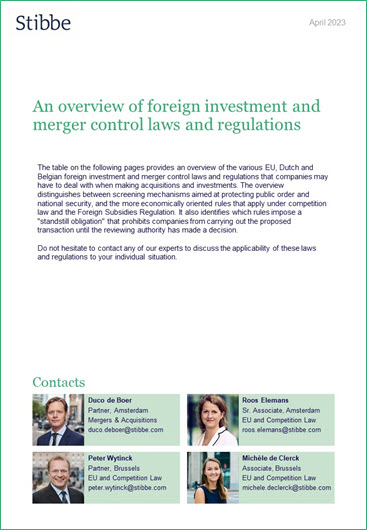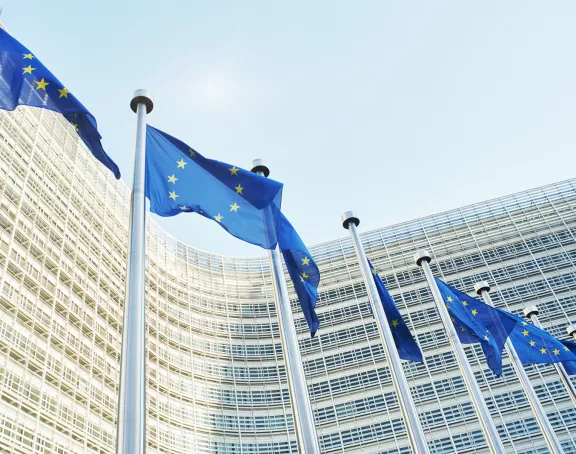The impact of geopolitical developments on transactions: a tangled web of rules and hurdles
Where is the line between openness and protectionism in the European single market? At both EU and national level, more and more protective barriers against foreign investors and acquirers have been created in the international competition. At the same time, current geopolitical relations lead to a greater awareness of possible risks to national security and public order in relation to certain transactions or public procurement.
The call for European champions (and their protection) in the global geopolitical playing field has evidently not fallen on deaf ears. Of the 27 member states, 26 have now introduced or proposed rules for screening (foreign) acquisitions. And even the Netherlands’ illustrious open economy seems to be increasingly hamstrung by all kinds of rules that are intended to prevent undesirable (foreign) parties from gaining a foothold in these sectors, and will thus prevent strategic dependencies: rules that companies will have to take into account when contemplating acquisitions and investments.
Wave of protectionism
The background of this new wave of protectionism is the increased interdependence of local economies, which depend on foreign parties, in combination with seismic geopolitical conflicts and tension. As the world falls apart into regional power blocs (geo-economic fragmentation), countries are raising legal fortress walls against unwanted foreign investments. The protection of sensitive sectors has taken priority over preserving jobs and attracting foreign capital. Terms such as “autonomy” and “self-sufficiency” are pushing the concept of the “open economy” to the background.
The predilection for European protectionism increased after the European Commission banned the merger of Germany’s Siemens and France's Alstom in 2019, which could jointly have competed globally as a European champion. In this case, the Commission considered undistorted competition within the EU more important than the formation of strong industrial blocs that could withstand foreign attacks. This gave rise to a great deal of criticism. In order to protect European companies from international competitive pressure, calls for an active European industrial policy grew. This also gave rise to the wish to protect companies against foreign acquisitions for the sake of national security and to protect the EU from unfair competition from abroad: a wish that may have been bolstered by the war in Ukraine.
The EU clearly acknowledges the need for protection. A framework for screening foreign investments on the grounds of national security and public order has been set up at a European level. Also, at the start of the COVID-19 crisis, European Commissioner Margrethe Vestager called on member states to introduce their own rules for screening (foreign) takeovers. There was a fear that companies might become vulnerable and an easy prey to foreign parties. There was a doomsday scenario of vaccine makers being purchased, or crucial links in the health care chain disappearing, as a result of which EU countries might no longer be able to protect their own citizens. By now, 26 EU member states have imposed or proposed national rules. Furthermore, in January of this year, an EU regulation against distortion of competition caused by foreign (i.e. non-European) subsidies in the case of transactions or public procurements entered into force. Lastly, the Commission stated in its 2023 work programme that it would “examine whether additional tools are necessary in respect of outbound strategic investments controls”.
The tangled web of rules comes with longer deal time lines, greater uncertainty and a greater administrative burden for parties to transaction.
Since the threatened takeover of KPN by Mexico's América Móvil in 2013, the Netherlands, too, seems permeated by the need to further protect national security. Since 2021, listed companies may invoke a reflection period in the event of a hostile public offer or shareholder activism. The Wet ongewenste zeggenschap telecommunicatie (Telecommunications Sector (Undesirable Control) Act), triggered by América Móvil’s effort to acquire KPN, protects Dutch telecommunications companies against unwanted owners and from too much geopolitical interference in a takeover. Other sectors, such as the gas and electricity sector, have long had similar screening mechanisms in place in case of changes in control in a company. As icing on the protective cake, the imminent Wet veiligheidstoets, fusies en investeringen or Vifo Act (Investments, Mergers and Acquisitions (Security Screening) Act) will safeguard national security by means of an investment test for acquisition activities in vital sectors and in the case of (highly) sensitive technology or (tech) business campuses (which were added after the acquisition of the High Tech Campus Eindhoven by a Singaporean state-owned company). The Vifo Act is expected to enter into force 1 June 2023.
Belgium also lagged behind in protecting its own companies for a long time. Apart from an ex-post control at the Flemish level on foreign investments in public institutions and agencies, and some isolated measures at the federal level aimed at economic security that were mostly historical (e.g., rules on ownership of ports and security systems for chemistry), there was no structural policy on economic security in Belgium. This often led to the sale of Belgian companies to foreign shareholders, without any government involvement or control. Some examples are well known: the (failed) attempt by China State Grid to acquire a stake in Eandis, the acquisition of a 90% stake in the Zeebrugge container terminal by the Chinese Ocean Shopping Company (COSCO) or Ping An's (minority) investment in what was known as Fortis. It was ultimately the introduction of the European framework for screening foreign investments that led Belgium to develop its own screening mechanism for foreign investments. Since both the federal government and the federal states have the authority to do so, this will be done in the form of a cooperation agreement. This cooperation agreement will provide for a screening mechanism on foreign investments that might endanger national security, public order or strategic interests (e.g., investments in sensitive sectors such as defense, energy and cybersecurity, media plurality, biotechnology, investments in activities affecting vital infrastructures for transport, water and health, electronic communications, digital infrastructures, food security, etc.). The cooperation agreement is expected to enter into force on 1 July 2023.
The implications for companies: stating the obvious?
To state the obvious: this tangled web of rules, with different notification criteria, regulators and notification processes, comes with longer deal time lines, greater uncertainty and a greater administrative burden for parties to transaction. Not just because of yet another notification form having to be completed, but especially because of the various potential stumbling blocks when analysing the possible mandatory reporting of their transactions.
Illustrative for this is that – even within the Netherlands – the terminology used in the various rules is not seamlessly aligned. The Electricity Act and the Gas Act, for instance, use the term zeggenschap (control), which derives from competition law. The Vifo Act also uses this term, as well as referring to significante invloed (significant influence). The Telecommunications Act, in turn, refers to overwegende zeggenschap (predominant control). On top of this, these different Acts provide for different procedures. Under one Act it may be allowed to continue the transaction during its assessment, while that may not be possible under another Act.
In addition, the interaction between the different rules is not always entirely clear. Some rules provide for a 'one stop shop' mechanism, while other rules that apply at the same time don’t. For instance, a concentration subject to European merger control need not also be notified under the Dutch merger regime. Similarly, the Vifo Act will not apply to a transaction already covered by a sector-specific regime. However, a reporting obligation under (European or Dutch) merger control does not exclude a reporting obligation under a sector-specific regime, the Vifo Act or numerous investment screening regimes in other jurisdisctions, while at the same time the Foreign Subsidies Regulation might apply.
Another identified problem is the lack of transparency. In the case of transactions in the field of sensitive sectors, information is often highly confidential. Because of that, not a great deal of information and case law is published.
In the Netherlands, questions and notifications may be directed to the Investment Screening Bureau (BTI), a subdivision of the Ministry of Economic Affairs and Climate Policy. Because specialized and technical knowledge is required in this field, the BTI works together closely with experts at various ministries. While it is clear that the BTI is willing to offer advice in this field, more uniformity of the regulations and greater transparency would be appreciated. It also cannot be excluded that the (small) BTI will have to scale up at some point: as long as the situation remains unclear, the BTI will receive more notifications than expected, because companies would rather notify than take the risk of being fined for failing to notify.
In Belgium, notifications and questions about the applicable rules will be addressed to a newly created body, the Interfederal Screening Commission (ISC). The ISC will consist of nine members representing the authorities involved in the cooperation agreement (i.e., FPS Finance, FPS Home Affairs, FPS Foreign Affairs, the Flemish, Walloon and Brussels-Capital Regions and the three Communities). The cooperation agreement provides for the ISC to draft and publish guidelines on the operation of the screening mechanism.
Moreover, transactions often cross borders, so companies will have to deal with a similar sets of rules in other countries (both within and outside the EU). This may result in a similar struggle between the different concepts and scopes. Some of the regimes have formulated their rules so broadly that it would have to be assessed for every proposed transaction whether a notification requirement applies. Footwear, for example, has already become a strategic commodity in Germany. The German government classified Birkenstocks, shoes that are popular among doctors, as personal protective equipment. This made the acquisition of the manufacturer of these shoes a matter of national security.
Although a catch-all rule is probably a bridge too far because of the different interests served by the various regulations, some harmonisation or coordination of the various rules does seem to be called for. Perhaps, in time, the Commission will attempt to regulate this field, but national security is often regulated at a national level. For now, companies will have to use checklists and overviews per jurisdiction.
Conclusion
Protectionism against international competitive pressures and foreign threats has its price. Companies will have to seek the blessing of a variety of regulators for certain transactions based on a variety of criteria. This affects not only transaction time lines but also deal certainty, and increases the administrative burden. Hopefully, the checklist provided will help alleviate and mitigate this suffering to some extent.
For an overview of the various EU, Dutch and Belgian foreign investment and merger control laws and regulations that companies may have to deal with when making acquisitions and investment, click on the picture below.

This article was co-authored by Peter Wytinck, former partner at Stibbe.



